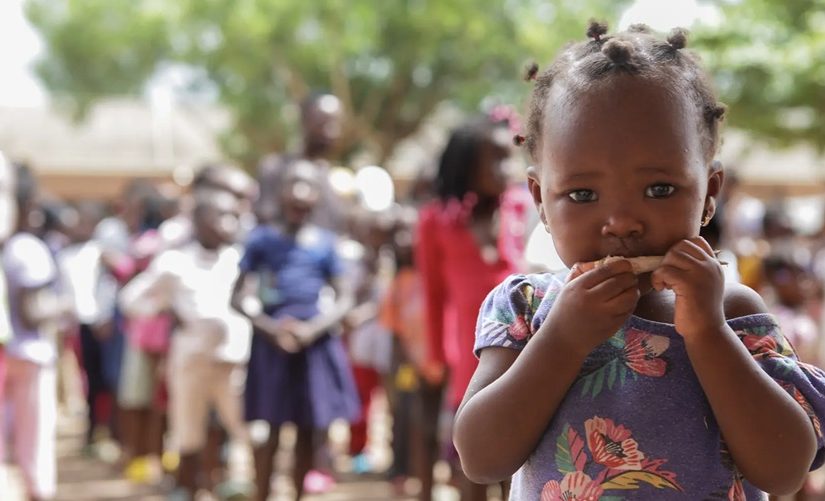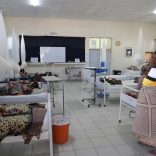BCI awards scholarships and strengthens musical training for young Mozambicans
Mozambique: About 650,000 children at risk from Cyclone Chido

FILE - For illustration purposes only. [File photo: Lusa]
Around 650,000 children are at risk from the impacts of Cyclone Chido in northern Mozambique, the non-governmental organisation (NGO) Save The Children warned on Sunday, adding that aid actions are underway.
,“Cyclone Chido is a catastrophe for children in northern Mozambique. They risk losing their homes, being separated from their families, and suffering limited access to water, sanitation, healthcare and education,” said Ilaria Manunza, Save the Children’s Country Director in Mozambique, quoted in a statement from the organization.
The official said that Save The Children has prepared staff and resources to support those most affected by the storm, as part of an “urgent and multifaceted response”, also mentioning the vulnerability of communities exposed to Chido.
“This storm is yet another example of extreme weather wreaking havoc on an already vulnerable community that has been torn apart by conflict and steeped in poverty,” added Ilaria Manunza.
According to the NGO, teams, who are already present in most of the worst-hit areas, will also prioritise setting up systems and services to ensure the protection of children, and help support the renovation of damaged schools.
” Save the Children is preparing to support affected communities with survival kits and other essential items, in coordination with other agencies.,” the statement also reads, warning of difficulties in providing assistance to Cabo Delgado, due to the presence of armed groups that have been carrying out attacks in the region since 2017.
At least four people died and another 37 were injured following the passage of Cyclone Chido in the provinces of Cabo Delgado and Nampula, organisations on the ground announced.
The cyclone, scale 3 (1 to 5), hit the coastal area of northern Mozambique on the night of Saturday to Sunday, according to the National Emergency Operations Center (CENOE).
The same service indicated that the cyclone weakened to a severe tropical storm, but that it continues to hit those two northern provinces, with “very heavy rains above 250 mm [millimetres]/24 hours, accompanied by thunderstorms and winds with very strong gusts”.
“This scenario presents a high risk of urban flooding and erosion in the cities of Pemba, Nacala and Lichinga, as well as in low-lying and riverside areas of the Muaguide, Megaruma and Lúrio river basins”, reads information issued by the CENOE, consulted by Lusa.
Around 200,000 customers were left without electricity in Nampula and Cabo Delgado due to the effects of Chido, the Electricity of Mozambique (EDM) announced on Sunday, and at least three flights to the northern region were cancelled on the same day by the airline Linhas Aéreas de Moçambique (LAM).
The Mozambican authorities had already admitted on Thursday that around 2.5 million people could be affected by the cyclone in the provinces of Nampula, Cabo Delgado and Niassa, in the north, and in Zambézia and Tete, in the centre.
Mozambique is considered one of the countries most severely affected by climate change in the world, facing cyclical floods and tropical cyclones during the rainy season, which runs from October to April.
The 2018/2019 rainy season was one of the most severe in Mozambique’s history: 714 people died, including 648 victims of cyclones Idai and Kenneth, two of the biggest ever to hit the country.
In the first half of 2023, heavy rains and the passage of Cyclone Freddy caused 306 deaths, affected more than 1.3 million people, destroyed 236,000 homes and 3,200 classrooms, according to official government data.
Save the Children warns up to 650,000 children at risk from impacts of Cyclone Chido in Mozambique, as aid effort prepares to mobilise https://t.co/1vxWptAevR
— Save the Children in Mozambique (@savechildrenMoz) December 16, 2024
🌪 Cyclone #Chido has left a devastating impact on communities across 🇲🇿 leaving tens of thousands in need of assistance & with critical infrastructure damaged.
UNHCR is on the ground, working tirelessly to provide protection & support to the most vulnerable. #CycloneChido pic.twitter.com/AmcR4LfnOv
— UNHCR Mozambique (@UNHCRMozambique) December 16, 2024












Leave a Reply
Be the First to Comment!
You must be logged in to post a comment.
You must be logged in to post a comment.